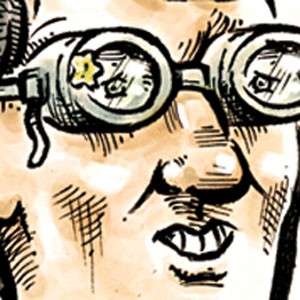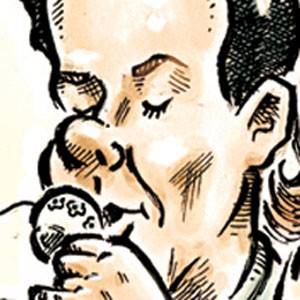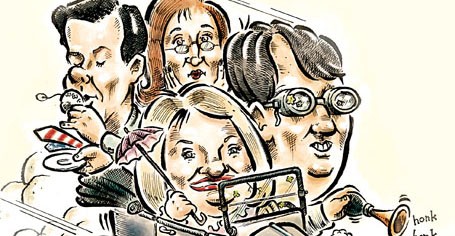;
Someone on this stage is going to be the future leader of Orange County government," says Gina Duncan, vice president of local gay business collective the Metropolitan Business Association (MBA), from a ballroom podium.
For the past half hour, the second floor of the downtown Sheraton has been abuzz with local political notables and power gays intrigued by the traveling circus that the Orange County mayor's race has become. For 10 years, the behind-the-scenes stoicism of tight-lipped mayor Rich Crotty has effectively diminished perceptions of the office to the point of inscrutability. Now a cacophonous foursome of candidates is pandering to the public for their voting consideration. It may not actually be a circus, but coming out of the collective slumber of the past decade, it certainly feels like one.
Among the pre-event whispers and howls – possibly muted by the unexpected absence of alcohol at an evening political gathering – there's an undercurrent of scandal. Former county commissioner Teresa Jacobs is absent even though she had previously confirmed her attendance.
"Someone told me she's stuck in traffic," an operative for candidate Linda Stewart says and half rolls his eyes. Others speculate a little more freely that Jacobs – a noted Republican who supported Florida's gay marriage ban in 2008 – probably has nothing to gain by attending the July 14 MBA Orange County mayoral candidate forum, or, for that matter, sharing a stage with the three other characters who have turned the campaign trail into a kaleidoscopic dust-up of caricatures. One of them, Tea Party businessman Matthew Falconer, stands awkwardly outside the ballroom. "I like this because it's social and business," he says, forcing a smile and alluding to the MBA's chamber-of-commerce-;like structure.
By 7 p.m. Duncan is trying to enforce some of that structure, sternly corralling the convivial into the ornate ballroom so that the candidates can get down to the business of selling themselves.
"I hope we can conduct ourselves with the utmost dignity and decorum," she says as she reaches into a cookie jar to randomly select questions. For the next two hours, Falconer (in a baby blue tie), county commissioner Bill Segal (in a pink tie) and Stewart (in a sequined blouse and bright red pants, naturally) largely eschew Duncan's suggestions, opting instead for something resembling a student council debate as delivered by a comedy;improv troop.
Stewart, whose grassroots have largely been woven from gay fiber, is a clear winner if the volume of applause is the apt ;indicator. Her bawdy performance and cigarette-lighter-dragged-across-the-bottom-of-a-whiskey-bottle crows about ethics, equality (she repeatedly alludes to a memo she sent to Crotty requesting attention to the issue) and courting big businesses to the area to bring quality jobs (The Sanford-Burnham Institute? She made it happen, she says.) play well here. But Segal, who also supports anti-discrimination policies ("It's vital that we do it, not just make political hay out of it," he says.), does manage some solid blows, specifically in asking for independent verification of Stewart's Burnham-wooing story. As expected, he leans on the business acumen that has made him the establishment candidate in the race.
"Who would you want sitting across the table from the next big employer?" he asks.
Falconer, meanwhile, conveys his anti-rail, pro-small-business message and, oddly, peddles his book, Building a Better Local Government, each time he speaks. He fumbles the same-sex benefits conundrum with an "I don't know this issue well enough to address your question." Another thing he doesn't know: gay adoption is illegal in Florida. "I'm here to learn," he says.
When Crotty steps down from his $150,000-a-year executive perch, will any of these hopefuls racing toward the golden prize be prepared to lead a county so deeply damaged by the recent economic downturn? And, maybe more importantly, why would they even want to?
To find out, we set up meetings with each candidate at a place of his or her own choosing (no stodgy editorial-board grilling here) and tried to subjectively nail down the personalities behind the campaign financing, mudslinging and talking points. Of course, much of what we got was just that: talking points. But we also got drunk, entertained, frightened, embarrassed and sometimes even found ourselves impressed during our anthropological foray into the natural habitats of Orange County's final four. The verdict: They might not all be as insane as they seem. This is politics, after all.
;;;; ;THE BUSINESSMAN
;"Sara!" screams a groggy Bill Segal. Judging by his tousled hair, he has apparently just awoken from a nap. "Sara, I need to know how long to cook the fish!"
Segal's communications director, Josh Wilson, suggested this family meal contrivance as a means of getting to know the real Bill Segal. He's a family man, one who likes to make a tradition of cooking meals for his family at his modest home in Winter Park, an approachable guy, not the corrupt, donor-class establishment stooge that the media – particularly his enemies at the Orlando Sentinel – have made him out to be. Sara, his philanthropic and very slight wife, goes so far as to prepare a sardonic platter of Spam for me, only to yank it away and throw it in the trash. They're a "fun" couple!
As some seafood conflagration sizzles on the stove, the casual conversation veers to some of Segal's eccentricities. He used to own a small chain of Chinese restaurants that was later bought out by Manchu Wok. He was one of the original investors in the Sci-Fi Channel (now SyFy). He doesn't want to serve me the expensive wine, lest the media come back to bite him in the ass again. The sarcasm is palpable, as is the sense that he's tired of being the good ol' whipping boy in a race that has increasingly focused on political ethics and backroom deals.
"I'm the front-runner in this race," he says as we sit down at the dinner table (Segal, a Democrat, has raised more than $600,000 since entering the fray). "So Linda Stewart throws mud at me. Teresa Jacobs throws the same stuff at me."
He is, of course, alluding to the recent bevy of scandals smearing his name: his presence at the all-male "No Name Club" hobnobs, some suspicious voting from his county commission post on projects involving a developer friend, his recent surprise vote in favor of the sprawl promised by the expansion of Innovation Way East. To Segal these are all explainable distractions. The No Name stuff was just part of making his regular political rounds ("People come to my office. They make an appointment if they want to lobby."). The votes for projects with former business associate Nancy Rossman – she and Segal reportedly grossed $2.5 million between 2004 and 2006 while he sat on the county commission; he severed ties in 2006 – were largely an oversight ("I didn't even know I was voting on them; I didn't make a dime."). The Innovation Way East vote has been misrepresented (mostly by Stewart), he says, as he was basically just trying to attract 25,000 high-paying jobs to the area, and to do so he had to play a little politics ("We'll hold our nose. It's the trade off.")
"People are so inured to think that every politician is a crook," he says, chewing his food. "I would say that [former] commissioner Jacobs has fed into that; the daily newspaper has fed into that; it's just the way of the world."
It's less defensiveness than it is acceptance with Segal. Even when delivering the typical campaign bile between bites, his voice never raises from its signature yawn and his face never tightens with rage. After six years as county commissioner, he comes off as willing to take his lashes.
"I have made a fantastic sacrifice, monetarily, to do this," he says. "A lot of people don't like me to remind people about that, but it's the truth. I made a lot of money, and I had a very nice life before this. I wasn't under the microscope. Now I make a fraction of what I used to, set that aside to do the work for the good of the public and for that, you know, you have people constantly ripping at you. People that want to succeed or get ahead of you or beat you in the mayor's race. That's life, that's politics, that's petty."
Segal jumped into the political fray in 2004 when he thought the candidate his standard "host committee" friends were supporting for county commission was being backed for all the wrong reasons.
"My kids were almost through college; I'd made a success of myself," he says. "I said, ‘If I don't run now, I'm never going to run,' and we need people who have made something of themselves rather than people [who] are just looking for a job."
Among the accomplishments he cites: a founding member of the Coalition for the Homeless, a former member of the Florida Symphony Orchestra (in a fundraising capacity; the organization folded in 1992), and eight years on the St. John's River Water Management District board. But his history in Central Florida goes back further than that. Segal's father Martin was responsible for securing the last patch of land necessary to bring Walt Disney World to the Orlando area. The Segals are part of the region's firmament. But firmament isn't always dynamic, and in such a tricky economic period, where foreclosure headlines barely obscure those decrying shrinking tax revenues, will Segal's historied nonchalance be enough to make ;things better?
He does have some ideas. Largely, Segal is hooking economic recovery on the seemingly bulletproof modeling and simulation industry, the hawkish technology corridor already growing steadily around UCF-adjacent Research Park. But he also touts some new (or borrowed) ideas about consolidating healthcare for county employees, as hotelier Harris Rosen has been doing with his staff. He wants people to eat healthier, to stop smoking, exercise. As for growth – or sprawl – the self-proclaimed economics-hobbyist (he rattles on for at least 15 minutes about economist Paul Krugman) considers himself a realist who plans to color between the appropriate lines.
"We're going to manage in difficult times," he says. "And trying to keep spirits up and doing the best we can. I'm used to it. It's not going to be a big, difficult time if I'm able to shepherd us through four years of difficult times and I'm able to say, ‘I did everything the best I could.' And they look back and say, ‘Grandpa, what the hell did you build?' Not one building, and that would be fine."
As the evening winds down, Sara Segal flutters about with her digital camera, eventually settling on an odd photo of my striped socks. She's a normal wife with a normal husband, and this is how normal evenings end.
"Be careful driving home," she says. ;Of course.
;; ;THE WILD HAIR
;"Eight years in office have taught me a lot about public service," says Linda Stewart, her voice perhaps too big for the amplifier it's being filtered through. "I'm just like you."
Stewart's drawn a crowd of about 25 at a meet-and-greet at the College Park eatery Taste. The usual progressive suspects are mingling about. It's a largely gay (and gay-friendly) mélange of door-knocking Democrats, many of whom helped Stewart stump for Hillary Clinton in the 2008 primary elections.
Activists Jack and Margo Dixon sidle up to me at the bar to let me know that the campaign has been going surprisingly well. Despite the absence of major donors – Stewart's spent most of the $130,000 she's raised to date – she's been the front runner in numerous polls. That groundswell isn't apparent here, though, as lounge pianist Randal Branham drowns out the polite chatter with a milquetoast rendition of "Circle of Life."
It should come as no surprise to anyone familiar with the quirkiness of this campaign that Stewart has her own song – a song she is about to introduce on a boombox in a ;restaurant. It's a variation on the Green Acres TV theme song.
"I'll try to sing along," she squawks. "Billy Manes is over there. I'll be singing with him later." Uh-oh.
But bizarre appearances can be ;deceiving. Her patchwork stunts often seem to be culled from a hayride-planning manual (she will forever be remembered for her drag impersonators at last year's Come Out with Pride parade), but Stewart's devotion to winning the county mayor's seat comes off as remarkably sincere, even urgent. If she doesn't have the cash, she has to gin up interest somehow. So that's exactly what she's doing. Following some more palm-pressing and booming laughs, she sits down at a table outside to explain the method behind her ;political madness.
"I've never had the money people behind me in any race that I've run. I was always outraised and outspent in every single race," she says, referring to her two successful county commission campaigns. "I think that my human appeal is my best asset. I think I relate directly to the people. They understand that I am who I am. I'm going to be honest. I'm not going to promise anything that I can't deliver on, but I'm going to try hard."
Stewart has taken the hard line on some controversial policies. Notably, she is the only candidate willing to use what she calls the "T-A-X word."
"We can't take taxes off the table," she says. "As much as there is no candidate out there that is willing to say, I think we may have to look at a surtax in order to provide the public transportation."
But that's not all she says. She's a noted environmentalist who claims to have fought hard against the sprawl included in the failed Innovation Way East plan (though Segal points out that she was in favor of the part of the package that would build more homes in the Econ area). She's vehement about getting equality measures into the county charter as soon as possible. She fought for red-light cameras, wants to acknowledge that the county is not effectively dealing with its homeless problems and, probably most importantly, is in favor of auditing the county's various departments for signs of corruption or inefficiency. She's become a stickler for ethics issues, though she doesn't want that to dominate the campaign. Hers is a message of hope, however clumsy it may appear.
When it comes to her opponents, she isn't afraid to pull off the gloves.
"You could vote for Teresa Jacobs – she is a very nice person – but Teresa is ‘my way or the highway.' She's not as open-minded as I am. She's not as engaging. She is very analytical to the point that she overdoes it," says Stewart. "Bill Segal [‘Black-tie-Billy,' she later calls him] will not work a crowd, will not go out and shake a million hands. I've been to practically every African-American church and have shaken hundreds, thousands of hands. I'm approachable. I really love people."
And from the looks of things at the dive-ish gay bar up the street, BarCodes, people really love Linda Stewart, too. For the second portion of her evening's stump, Stewart's opted for a karaoke night at the watering hole, and as part of our pre-interview agreement, she's forced me into the corner of ;public embarrassment.
"I only do country and western," she drawls. "I love the Dixie Chicks."
We settle on Kenny Rogers and Dolly Parton's '80s classic "Islands in the Stream," a song that she apparently does not remember.
"How can we be wrong?" I scream out of tune over the cameras and clamoring of the crowd, professional ethics be damned. How? Like this.
;; ;THE OPPORTUNIST
;"This rain is brought to you by Buddy Dyer," Matt Falconer jokes as the skies open up outside the downtown Orange County Courthouse.
It's an odd scene, really. The expected rag-tag Tea Party brigade has scurried its way under the overhang outside the state attorney's office. "Honk for lower taxes!" reads one poster-board sign. "Schools or rail, you decide!" reads another. "Stop Obama-Grayson-Segal! Orange County is key to the country!" declares yet another. The event at hand is a hastily organized press conference to mark Falconer's filing of a lawsuit against the county for moving forward with its SunRail ambitions; the new commuter rail line will "force a future tax increase or force future cuts in teachers," says Falconer.
A WFTV Channel 9 news reporter asks him – "with all due respect" – whether this is, in fact, a political stunt. Falconer explains that it can't be a political stunt because he's been "on this for three years." In those three years, Falconer has produced two self-published books: the aforementioned Building a Better Local Government and the slightly more bombastic The Socialist Republic of Florida. He also launched his bid for county mayor last June. The reporter points out that Falconer's suing of the county might be in direct conflict with the very office that he is running for.
"That's what I am. I'm a leader," is Falconer's retort.
The Orlando Weekly has covered Falconer's past and his campaign launch extensively in the past (see "How to run a campaign and alienate people," July 23, 2009). He's a former developer who built strip malls adjacent to Wal-Mart locations, thereby saving advertising overhead. Then the economy dried up and he became a malcontent. But it's his present that becomes the focus as I pull him away into the lobby of the main courthouse. ;What's changed?
"I've learned a lot, you know," he says. "I was not a politician when I got in. I was a flat-tax advocate. I've learned to smooth my approach to things, and that really, that people aren't the villains, but the system is, and that individual people play the game that the system is, and the system is corrupt … I don't really have the resentment toward the players now – just the game."
Well, that's not exactly true. In addition to referring to Jacobs in a questionable light later in the interview ("I'm not making stuff up or calling her a bitch," he says), Falconer remains on the steady muckraking path that characterized the beginning of his campaign. He is the outsider, a self-proclaimed reformer and, at least to some degree, carries his own brand of political paranoia.
"You know, I would say – and you can print this – that all of my opponents drank the Kool-Aid of special interests. They all voted for the arena; they all voted for the rail system; they all voted to give the [Sanford] Burnham Institute $300 million to bring 150 jobs here, and that is obviously not working," he says. "Unemployment has quadrupled since they got in office. It's not working because it doesn't work. What I would tell them is we need to do the exact opposite of what we've done for the past 10 years, which is taking money from small business and giving it to politically connected ;big business."
Falconer's platform rests squarely on the broad shoulders of populist anti-incumbency discontent (he appeals to those of both Republican and Tea Party leanings, though this is a non-partisan office), and, at least to some degree, that's made him a viable player in this year's contest. He was not able to qualify for the ballot by petition (instead he paid the $6,000 filing fee to run), but he's pulled in respectable numbers, financially speaking – $282,000 as of mid-July, though much of that was from his own pocket – and has polled respectably. He claims to have knocked on 22,000 doors. His message, as you might expect, toes the free-market capitalism line.
"We have to have priorities: education, public safety and basic social services," he says. "In my opinion, that's all government should do. The free market will take care of the rest. We can't plan an economy."
Falconer comes off more confident – even competent – in his delivery than he did 12 months ago. The stunt that drew the placard-holding crowd outside seems to have made him giddy with himself; he's practically patting his own back, to be honest. But the obvious duplicity of his running for office while hating office is still there, pressed up in the creases of his salesman smile.
"The price of admission is to sell your soul," he says, ominously. "It makes me nauseous sometimes, but the more support I have from people out there like that [he motions out the window], the more galvanized my mission is. It's not like I'm being a chameleon to become a politician; I'm the same person I was a year ago today – I'm probably more so."
And that person assures me that, though he suspects Jacobs has run afoul of her own ethics message by taking a $50,000-a-year consulting job following her tenure in office, he is "not calling her a bitch."
"I'm trying to use three parts sugar, one part vinegar," he says.
;; ;THE SCHOOLMARM
;"You don't mind my bare feet, do you?" Teresa Jacobs asks as she breezes past a pool table and into the dining room of her campaign consultant John Dowless' South Orlando, Lake Holden home.
It's about the last disposition you would expect from the county's former commission contrarian; Jacobs has a reputation for being "intense and very detailed," according to a journalist friend I contacted before the interview. A local politician suggested that I refer to her as Mother Teresa. I tell her as much, and her response is warm laughter (it should be noted that five minutes earlier, my receptionist received a nasty phone call from the Jacobs' campaign saying that I was five minutes late). She reminds me of ;my mother.
Jacobs left office in 2008 and has since been handling "part-time" consulting duties – to the tune of $50,000, annually, reportedly – for Tindale-Oliver & Associates, a planning and engineering company that boasts LYNX as one of its clients. She says she uses every dime to put her kids through college. The transition to real life was difficult, she says.
"When I left, I thought, ‘I want to see what toll this has taken.' Because sometimes when you're in the midst of things, you can't really measure how it's affecting you," she says.
So the first week out of office, she found herself standing in the kitchen cooking with her youngest son, who was 18 at the time.
"It was the first time in years that my brain and every part of me was in the kitchen," she recalls. "And I realized I'm not thinking about what I'm going to vote on, how I have to say it, who I need there, what the counter response is going to be. None of that pressure. I'm just 100 percent here. That was kind of nice."
Less than two years later, Jacobs announced her late entry into the mayoral race on Jan. 26 (by mid-July, she had raised $187,000), but not before reminding herself of a golden rule: "I told myself, ‘Don't believe the compliments that people pay you when you're in office,' because chances are a lot of them are because they want something, and two, if you do, your head will blow up."
Jacobs wasn't often in receipt of compliments from most of her cohorts – Mayor Crotty publicly resented her – but she did gain the esteem of the public and much of the media for her hard-nosed approach to ethics in local government. On the commission, she was often the lone vote against development interests; she was quoted in a 2005 profile in the Orlando Sentinel saying, "Every nice thing I have said has gone nowhere."
Her "two core, gut-level issues": public engagement and ethics. But she insists her do-good image isn't just a personality glitch. When she calls out officials – specifically Crotty and Segal – for the appearance of impropriety by accepting gifts, she says it's for a larger purpose.
"When that makes the news and you've got companies saying, ‘Well, where do I want to relocate? Hmm, Central Florida – it looks like insider, good ol' boy. I wonder who I have to pay to play,'" she says. "That kind of culture and reputation destroys our potential for bringing quality businesses here."
That, she says, is something that is easily reversed. She is, after all, not a "boy." Here comes the pitch.
"I think very quickly you can change the brand, the reputation of Orange County," she says, noting that the good ol' boy network tarnished the county's reputation. "We also have a reputation of being a great place to come and visit – and that's good, it put us on a global map – but we've got to be more than the place to come and have fun. We've got to be the place that's highly professional, an exciting place to live, and we can do that because we have all the makings for it and one of the impediments we have ;is government."
Jacobs struggles with the "intimidating" label that she's been branded with, but stands by her manner of asking questions and demanding answers. She can nitpick, but can she lead?
"I still believe in campaigns and in public service. I still believe in honesty – and this campaign may devastate my belief system at the end of the day," she says. "I can afford to lose, OK. I always say, the one thing I can't afford to fail out of is raising my kids. But if honesty doesn't come through in this campaign, if it doesn't prevail, if the public doesn't get to see what the true facts are in the race and make a decision based on that, I'll be disappointed. But all I can do is try."
Throughout our interview, Jacobs' campaign manager – and former commission aide – Lynette Reynolds flanks my side, nervously typing into her laptop (I suspect she's the one who called the office to complain.). When I ask Jacobs to tell me something wild about herself that might help diffuse her reputation as a downer, Jacobs looks over at her and asks if it's OK. It is.
"My rave club was probably the wildest thing while I was in office," Jacobs says. "I did an undercover all-night sting ;operation on rave clubs." She starts ;laughing uncontrollably.
In 2000 when Crotty was launching his assault on rave clubs in Orange County, Jacobs didn't want to make a decision on the matter without exploring it first. So she called up an old high school friend, went shopping, headed down to the Sheriff's office and ;hilarity ensued.
"They do the debriefing beforehand and everybody gets their marching orders and we're driving over and suddenly all these totally straight guys I've been hanging out with all evening, talking about what we're going to do, turn totally gay on me," she laughs some more. "We don't realize it's a gay rave club until we get there. And there's Cheryl [the high school friend] and I paired up together. We went there and of course there were a bunch of people that we know and we didn't know they were gay."
I ask her about her absence at the MBA forum the night before. Was it a statement of position on the issue? Does noted Republican Teresa Jacobs hate gay people?
"Can I say that some of my friends are gay?" she says.
Well, that's politics.
; [email protected]





















